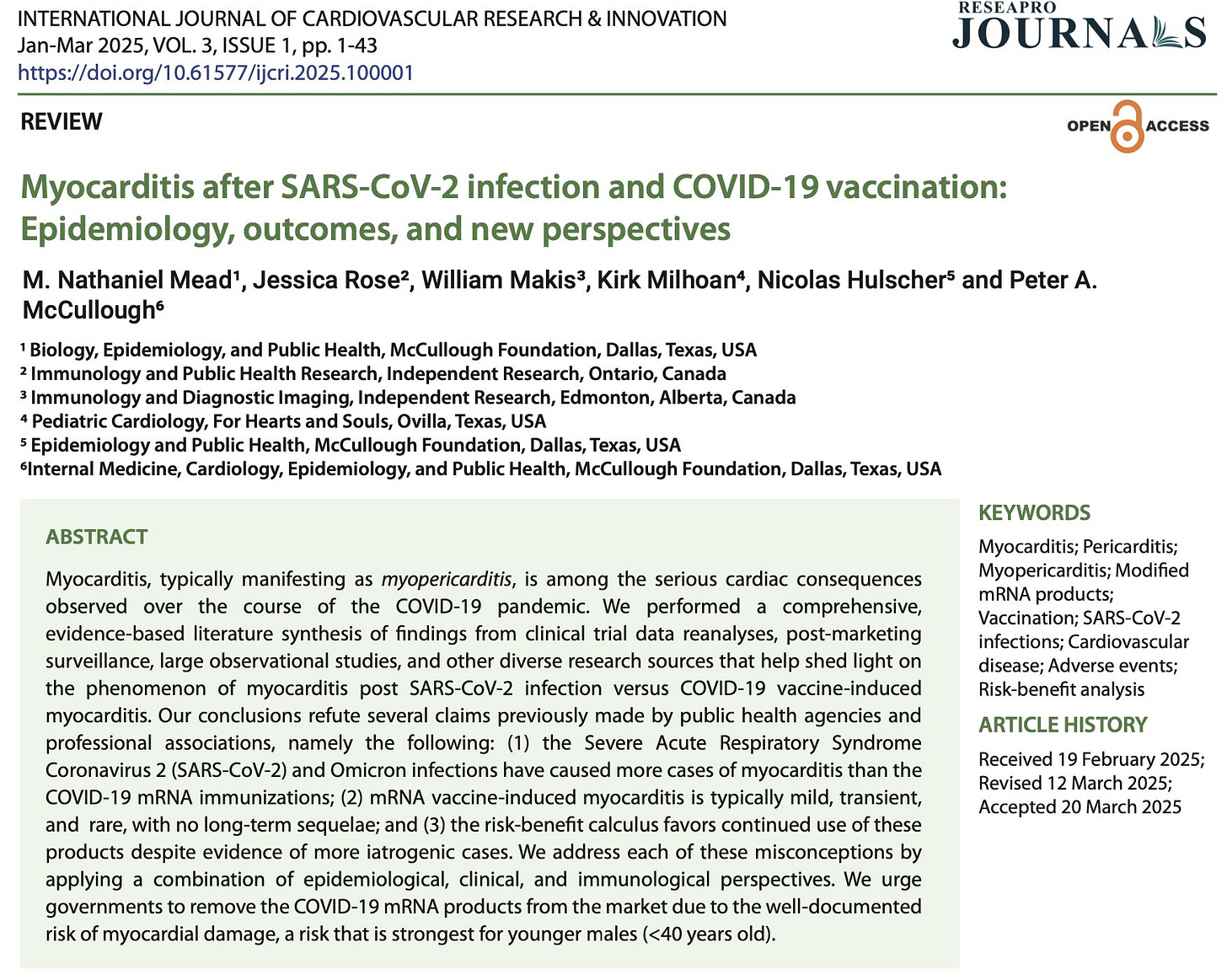Shocking Study Blows Hole in the COVID Vaccine Narrative
New study finds mRNA shots trigger 620% spike in myocarditis risk among young men.
This article originally appeared on Independent Medical Alliance (formerly FLCCC) and was republished with permission.
Guest post by Independent Medical Alliance
Independent Medical Alliance (IMA) Senior Fellows Dr. Kirk Milhoan and Dr. Jessica Rose co-author new study comparing SARS-CoV-2 infection and COVID-19 vaccination.
Groundbreaking New Study Reviews Large Body of mRNA and Myocarditis Research Data
Heart Risks Much Higher than Previously Reported; Younger Men Bear the Brunt of Growing Crisis
“Any doctor who has practiced medicine for any reasonable amount of time will view these findings as a major alarm. The continued use of mRNA risks generational harm to the American people.” – Dr. Kirk Milhoan
(Washington, DC) – A groundbreaking new study published in the International Journal of Cardiovascular Research & Innovation is sounding alarms about the safety of COVID-19 mRNA vaccines, directly challenging claims from public health officials and raising urgent questions about transparency and trust. Using hard data from disease trends, patient outcomes, and immune system analysis from multiple research reports, the study reveals that heart inflammation risks tied to the vaccines may be far greater—and more dangerous—than previously reported, particularly among young men, shaking confidence in official narratives.
For example, South Korea’s massive 4.5 million-person study found a stunning 620% spike in myocarditis risk and a 175% jump in pericarditis risk after mRNA vaccination. That’s not a typo—six times the normal rate of heart inflammation, often hitting within days of the shot. Chest pain, racing hearts, and crippling fatigue are just the start—many cases morph into “myopericarditis,” a dangerous combination of heart and sac inflammation confirmed by MRI scans. Young men under 40, especially teens aged 12-24, are up to seven times more likely to exhibit these symptoms than girls their age.
These findings also paint a stark picture: the public may have been misled about the true costs of these vaccines. “Our findings demand a hard look at what we’ve been told,” said Dr. Kirk Milhoan, IMA Senior Fellow, Pediatric Cardiology and one of the study’s authors. “Transparency is non-negotiable when lives are at stake.”
“To get your papers published, you’ve had to say ‘safe and effective’ over and over, and that’s a real problem in our field,” added Jessica Rose, IMA Senior Fellow, Computational Biology and one of the study’s authors. “It’s shocking. People need to understand the dangers here. Political correctness has no place in medicine.”
The study’s bombshell conclusions specifically debunk three major claims pushed by health agencies:
1) Vaccines Cause More Heart Issues Than the Virus: Contrary to assurances that COVID-19 infections posed a bigger threat for myocarditis (heart inflammation), the study shows mRNA vaccines like Pfizer and Moderna may trigger more cases than the virus itself, including during Omicron waves.
2) Heart Risks Aren’t “Mild” or “Rare”: Health officials called vaccine-related myocarditis mild, short-lived, and uncommon. The study counters that these cases can be severe, long-lasting, and more frequent, with potential for lasting heart damage in some patients.
3) Risks Outweigh Benefits: Agencies insisted the vaccines’ benefits far outweigh any downsides. The researchers argue the opposite, pointing to a higher-than-expected toll of vaccine-related harm that calls the ongoing push for mRNA shots into serious question.
This revelation lands as Americans grapple with growing distrust in institutions, from government to Big Pharma, including revelations that high-ranking CDC personnel may have deleted critical mRNA injury data. The study calls for immediate scrutiny of vaccine policies and a renewed focus on individual choice in healthcare decisions.
The full study, authored by M. Nathaniel Mead, Jessica Rose, William Makis, Kirk Milhoan, Nicolas Hulscher, and Peter A. McCullough can be found here.
About Dr. Kirk Milhoan
Dr. Kirk Milhoan is a pediatric cardiologist with more than 25 years of experience, based primarily in Kihei, Hawaii, and San Antonio, Texas. He holds a BA from Point Loma Nazarene University, a PhD in Cardiovascular Physiology from UC San Diego, and an MD from Jefferson Medical College. He completed his pediatric residency in the Air Force and a cardiology fellowship at San Diego Children’s Hospital. A former Air Force Lieutenant Colonel and flight surgeon, he’s board-certified in pediatric cardiology and has worked with hospitals like Methodist Hospital in San Antonio. Dr. Milhoan is also a Senior Fellow of Pediatric Cardiology for the Independent Medical Alliance (IMA).
About Dr. Jessica Rose
Dr. Jessica Rose holds a Bachelor’s degree in Applied Mathematics from Memorial University of Newfoundland, a Master’s degree in Immunology from the same institution, and a Ph.D. in Computational Biology from Bar-Ilan University in Israel. She completed two postdoctoral fellowships—one in Molecular Biology at the Hebrew University of Jerusalem and another in Biochemistry at the Technion – Israel Institute of Technology. Her expertise spans applied mathematics, immunology, computational biology, molecular biology, and biochemistry, making her a multidisciplinary researcher. Dr. Rose is also a Senior Fellow of Computational Biology for the Independent Medical Alliance (IMA) and a Brownstone Institute Fellow.
About IMA (Formerly FLCCC Alliance)
Formerly the Front Line COVID-19 Critical Care Alliance, the IMA has grown into America’s leading organization of frontline doctors, healthcare providers, and researchers advocating for full reform of government healthcare agencies, including transparency on conflicts of interest, pricing and payments, drug and vaccine injuries, and other essential reforms to restore trust in healthcare agencies.
For media inquiries: Lynne@imahealth.org
Copyright 2025 Independent Medical Alliance






If you aren't outraged you're not paying attention.